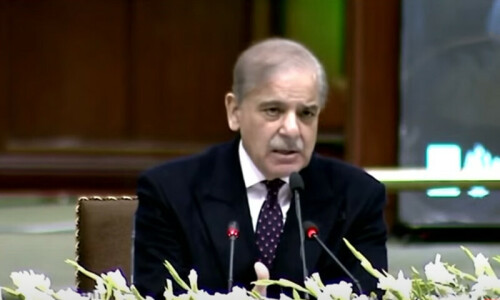IF the government announces replacing the parliamentary system with a presidential one, would the reason suffice that many democracies in the world have presidential systems? And since parliamentary democracy in Pakistan has “failed”, it should be abolished?
Establishing a constitutional court to perform constitutional review by stripping the Supreme Court (SC) of this function is as fundamental a change for the judiciary. Yet, reasons for this change have so far been feeble and rhetorical, if not altogether absent.
Constitutional courts were first established in the beginning of the 20th century in Europe to “defeat the dogma of parliamentary supremacy”. Previously, parliamentary sovereignty was jealously guarded, and even the highest courts did not have constitutional review powers.
This gradually changed after World War I. As Austrian jurist Hans Kelsen wrote, “it is no longer possible to rely on the parliament itself to realise subordination to the constitution”, and the task of “nullifying its unconstitutional acts must be entrusted to a separate organ, independent of it and of any state authority”, ie, a constitutional court.
We don’t even have a draft for the ‘constitutional court’.
Gradually, a concentrated model of constitutional courts with exclusive jurisdiction over constitutional interpretation proliferated, initially in Europe, and then other parts of the world, including, for example, Russia, South Africa, and Indonesia. The powers of these courts are somewhat different, but their origins are similar. They were established during democratic transition, ostensibly as a check against authoritarianism and to safeguard the constitution where existing courts did not already have constitutional review powers.
Pakistan’s context and judicial system, as is evident, are very different. Here, the SC and high courts already have powers of constitutional review and enforcement of fundamental rights. What is being proposed is to take these powers from existing courts and hand them over to a new ‘constitutional court’.
The government has to discharge a very high burden to show why such a change is necessary, and what problems it would fix.
A typical response is that the SC has ‘failed’: it has weakened civilian governments; delivered populist judgments; and rewritten the Constitution. All this is undeniable. But the ‘solution’ — that the same powers should be concentrated in a different court — is bewildering.
This ‘solution’ ignores that any court when it is interpreting the constitution or fundamental rights is likely to deliver rulings perceived as ‘controversial’. And where these rulings have political implications, courts will necessarily become politicised. This is inherent to constitutional review and is the experience of many constitutional courts around the world.
A few other points should be considered. First, politicisation of the judiciary is not just because of ‘judicial activism’. Political parties often bring political disputes to court for adjudication, without utilising other forums of resolution. This needs to change.
Second, there is now growing recognition within the SC that legitimising military coups had disastrous consequences, and that courts should respect the separation of powers within the constitutional scheme. It should be seen whether this leads to course correction.
Third, some safeguards have already been introduced to regulate the SC’s powers. An appeal lies from Article 184(3) judgments; a minimum of five judges hear matters of constitutional interpretation; and a committee, instead of the chief justice alone, decides when to invoke Article 184(3).
A lot more, of course, must be done — by the courts and parliament. The judicial appointments process should be made more tran-sparent and inc-lusive (including ensuring provincial and gender representation). Judicial accountability should be made more meaningful. And the ambit of Article 184(3) should be clarified. But throwing the baby out with the bathwater would be a grave mistake.
India’s Law Commission, as far back as 1984, considered reforming the country’s supreme court. It rejected establishing a separate constitutional court, as doing so would involve “extensive and complex changes” to the existing structure. Instead, it recommended “incremental changes” to augment the apex court’s competence and capacity.
We are not as fortunate as, let alone reports informed by the opinions of constitutional scholars, we don’t even have a draft for the proposed ‘constitutional court’ to deliberate upon.
After nearly 70 years, Kelsen has made a return in Pakistani politics. In 1958, the SC misapplied his theory of “revolutionary legality” to legitimise Ayub Khan’s coup d’état. Now, instead of ensuring the “subordination of parliament to the Constitution”, the government is distorting his idea of a constitutional tribunal to control the judiciary.
The writer is a lawyer.
Published in Dawn, October 13th, 2024













































